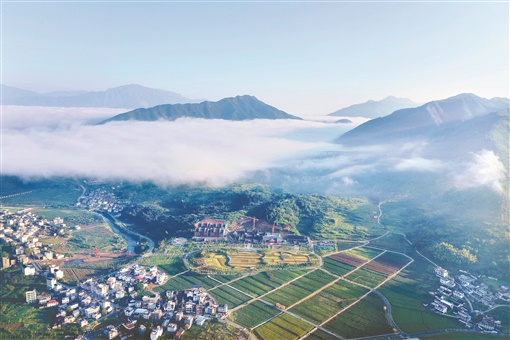Happy life of people in Chenzhou old revolutionary base areas
2022-08-02 11:01:44
The tradition of revolution has been passed down for generations, and the brave people in Southern Hunan have been making a concerted effort to develop the green mountains into the anchors of happiness.

Recently, reporters came to Guidong County, Rucheng County and Yizhang County to explore the happy life of people in the old revolutionary base areas.
Shatian Town, Guidong County: hills covered with traditional Chinese medicinal herbs
In Wenchang Village of Shatian Town, Guidong County, hills and fields of roughhaired hollies sprout new leaves. Villager Guo Manlian was busy weeding and fertilizing the roughhaired hollies to help them grow better. At the end of the day, she could get a payment of 100 yuan.
“I’m uneducated. I didn’t expect to earn 3,000 yuan a month in my 60s,” said Guo. In this season, more than 200 people in the village work together on the mountain, which constitutes a lively picture.
Wenchang Village boasts fertile land, mild climate and rich resources of traditional Chinese medicinal herbs. Li Yongfeng is one of the locals who rely on mountains for living. “More than 2,000 mu (about 133.33 hectares) of roughhaired holly seedlings were transplanted from the mountains, which saved a lot of costs,” she said.
In 2018, Li Yongfeng established Guidong Ruiyuan Agricultural Co., Ltd. and planned to grow medicinal herbs in the mountainous area of the village. She mobilized 320 households in the village to work together with the mode of “company, cooperative, base and farmer”.
Last year, Guidong Ruiyuan Agricultural Co., Ltd. and China Resources Sanjiu Medical & Pharmaceutical Co., Ltd. signed a long-term contract.
According to the contract, roughhaired hollies of 2,000 mu (around 133.33 hectares) to 4,000 mu (about 266.67 hectares) are planted each year. China Resources Sanjiu Medical & Pharmaceutical Co., Ltd. purchases the roughhaired hollies at the guaranteed lowest price.
It is learned that the county has made the planting of traditional Chinese medicinal herbs its leading industry of “one county, one specialty”, and has grown more than 50 varieties of traditional Chinese medicinal herbs, with an area of 220,000 mu (about 14,666.67 hectares) and an annual output of 210 million yuan.
At present, the county has 14 enterprises planting traditional Chinese medicinal herbs and 38 farmers’ professional cooperatives, which have created jobs for 58,400 people.
Shazhou Village, Rucheng County: better life than that in city
The spacious teaching buildings, the wide playground and the well-equipped student apartments... Children are learning in such a pleasant environment in Furong School of Shazhou Village, Rucheng County.
The school is a provincial key education poverty alleviation project, which covers an area of more than 30,000 square meters with a total investment of over 70 million yuan. It was officially put into use last autumn. There are 77 teaching staffs, 25 classes and 1,195 students in total.
“You’ll be studying here in a few months. Isn’t it as good as the schools in the city?” Villager Zhu Xinliang was visiting the school with his 6-year-old grandson.
Zhu Xinliang used to be a farmer. When the story of “Half A Quilt” made the village a famous red tourist spot nationwide, he seized the opportunity to engage in agritainment and earned over 300,000 yuan last year. Now his four children all come back to hometown to start business.
“The life in the village is better than that in the city.”
“Let’s see the new house built by the local Party committee and the government,” Zhu Xinliang said as he pulled his grandson toward the entrance of the village. A total of 30 million yuan was invested in this project covering an area of 32 mu (around 2.13 hectares), which can solve housing problem bothering 48 households.
In recent years, the local Party committee and government have been keeping people's urgent needs, worries and hopes in mind and put them into practice, so that the people enjoy continuous income growth and great changes have taken place in the village.
Last year, the villagers’ per capita income reached 17,100 yuan and the village collective income amounted to 705,000 yuan.
Zhongjia Village, Yizhang County: a year of tea harvest
People in Zhongjia Village of Mangshan Yao Township, Yizhang County, were busy working in the mist-shrouded mountains.
Zhao Liangmei has been planting tea for 10 years, and her tea garden covering 8 mu (around 0.53 hectares) can bring her a net income of more than 60,000 yuan a year. She said she could have planted more if she hadn’t been taking care of her grandchildren.
Zhongjia Village is over 800 meters above sea level. It is surrounded by clouds and fogs all year round, and has abundant rainfall, which is suitable for growing tea. In the early 1990s, the villagers began to plant tea, and now the planting area has reached 2,400 mu (160 hectares).
“Our tea features strong fragrance and can be brewed many times. It has won gold medals twice at the provincial Agricultural Fair,” said Liu Jijun, secretary of the Party branch of Zhongjia Village. “The tea is in short supply around the Qingming Festival every year and it has been exported to all parts of the country.”
Liu Jijun said that with the support of the county, four tea-planting cooperatives were set up in the village, involving more than 150 farmers. Those who do not participate in the cooperative will produce and sell tea all by themselves. Every family in the village has a tea garden, and everyone can get benefit from it.
By the end of last year, the county had planted 66,000 mu (4,400 hectares) of tea, with a total output of 1,680 tons, the total output value of nearly 500 million yuan and approximately 20,000 people getting rid of poverty.
The county has also successfully won titles like the “National Top 100 Tea Industry Counties” and “Hunan Top 10 Tea Industry Rural Revitalization Counties in the Year of 2021”.




